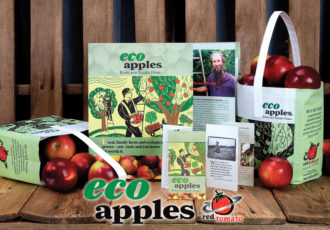For Northeast apple farmers it was a matter of survival. Facing a perfect storm of rising land, oil and labor prices, along with fierce competition from China and Chile, the apple farmers needed to find new revenue streams fast. They began a collaboration with Red Tomato, a Massachusetts-based nonprofit organization that helps connect consumers to family farmers who sell products grown with organic, integrated pest management (IPM) and biodynamic farming methods.
The apple farmers and Red Tomato launched Eco Apple, a project that markets locally grown apples certified by the IPM Institute of North America. The number of producers in the program quickly doubled, and Red Tomato's marketing savvy has placed their apples in national chains like Trader Joe's, Whole Foods and Stop & Shop, among others. Sales of Eco Apples have jumped from 7,500 cases in 2003 to almost 50,000 cases in 2007.
Eco Apple is just one program of Red Tomato, which has been helping farmers maximize volume, quality and price for more than 10 years. SARE was one of Red Tomato's early supporters, awarding a grant that got the group off the ground and allowed it to experiment with different ways to help farmers. In those first years, Red Tomato tried acting as a distributor for small farmers' products. Enormous costs and brutal competition, however, forced it to shift to its current focus on marketing. "SARE recognized early on how important it was to support us at such an early stage," says Red Tomato founder Michael Rozyne. "They gave us money at the most crucial moment."
Rozyne was one of the original founders of Equal Exchange, an international coffee company that ensures fair prices for producers. With stiff competition squeezing many American small farmers out of business, Rozyne decided to implement a similar program for farmers at home. Starting with six producers, the organization now works with 30 in the Northeast and 12 in the South, mostly fruit and vegetable growers.
John Lyman of Lyman Orchards, one of Eco Apple's originators, says that Red Tomato's pricing strategy was essential to his orchard's success. "They get a good premium on our produce, which we didn't get ourselves. Rather than a one-price-fits-all philosophy, they believe in the value of differentiation. With other brokers, you might be one of many, but with Red Tomato, their focus is on the supplier. The big difference with them is loyalty."
When SARE originally awarded its grant in 2002, a handful of Red Tomato producers collectively earned $500,000. In 2007, the 42 producers working with the organization made an impressive $2.1 million. With sustainable farming growing fast in the Northeast, Red Tomato's strategies are critical for ensuring fair trade for small-scale "eco-growers".

